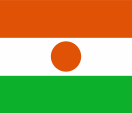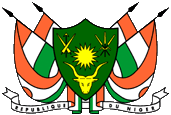|
|
| Übersicht – Contents: | |
|
|
| Übersicht – Contents: | |
Flagge – Flag: |
|
 |
Nationalflagge – national flag, Seitenverhältnis – ratio = 6:7 (?), Quelle/Source: Corel Draw 4   |
| Die Flagge von Niger wurde am 23.11.1959 offiziell eingeführt. Sie zeigt drei waagerechte Streifen in Orange, Weiß und Grün mit einer orangefarbenen Scheibe in der Mitte des weißen Streifens. Die Scheibe symbolisiert die Sonne, aber auch die Verteidigungsbereitschaft des Volkes von Niger. Die drei Streifen sollen die drei geographischen Gebiete verkörpern, aus denen Niger besteht: das grasreiche Flussgebiet des Niger (grün), die Savanne (weiß) und die Wüste (orange). Weiß steht außerdem für Reinheit, Unschuld und Harmonie. Wahrscheinlicher ist allerdings, dass die Farben auf die Flagge der Elfenbeinküste zurückgehen, mit der Niger einst verbunden war. Die Flagge ist zwar fast quadratisch, doch wird sie oft im Format 2:3 dargestellt. Das mit 6:7 recht eigenartige Format der Flagge gilt als umstritten, denn die seit 1959 gültige Flaggenverordnung legt kein Format fest, auch ist die Größe der Scheibe in der Mitte nicht definiert und außer Orange und Grün sind die Farben nicht spezifiziert. Die bei der farblichen Darstellung der Flagge am häufigsten widergegebenen Farbtöne könnten als Pantone 1665 für Orange und Pantone 362 für Grün stehen. In der Zeit als französische Kolonie wurde die französische Trikolore verwendet. | The flag
of Niger was officially introduced on 23rd of November 1959. It shows three
horizontal stripes in orange, white and green with a orange-coloured disk in
the middle of the white stripe. The disk symbolizes the sun but also the
readiness for defence of the people of Niger. The three stripes should
embody the three geographical areas which Niger exists of: the abundant in
grass area of the Niger River (green), the savanna (white) and the desert
(orange). White stands also for the purity, innocence and harmony. More certainly is that this colours have their roots in the flag of the Ivory Coast. With it Niger was once connected. The flag is indeed nearly quadratic but it is often reproduced in format 2:3. The flag's rather peculiar format / side ratio of 6:7 is considered controversial, because the Rlag Regulation, which is in force since 1959, does not specify a format, nor is the size of the disc in the centre defined, and apart from orange and green, the colours are not specified. The hues most commonly reflected in the colour representation of the flag could be seen as Pantone 1665 for orange and Pantone 362 for green. In the times as a French colony was in use the French Tricolor. |
| Quelle/Source: Wikipedia (DE), Die Welt der Flaggen, Flaggen und Wappen der Welt, Flaggen Wappen Hymnen, Volker Preuß | |
Wappen – Coat of Arms: |
|
 |
Wappen von Niger – coat of arms of Niger, Quelle/Source: Corel Draw 4 |
| Das Staatswappen wurde am 01.12.1962 eingeführt. Auf einem grünem Schild zeigt es eine goldene Sonne, Tuareg-Schwerter und einn Speer, die an die Tapferkeit des Volkes in der Vergangenheit erinnern. Weiterhin zeigt es Hirseähren und einem Büffelkopf, beides Symbole für Viehhaltung und Landwirtschaft. | The coat
of arms was introduced on 1st of December in 1962. It shows on a green shield a golden sun Tuareg swords and a spear which remember the bravery of the people in the past. Furthermore shows it millet-ears and a buffalo-head both symbols for stock-farming and agriculture. |
| Quelle/Source: Flaggen Wappen Hymnen | |
Flugzeugkokarde – aircraft roundel: |
|
 |
seit/since 1980, Flugzeugkokarde – aircraft roundel Quelle/Source, nach by: Wikipedia (EN) |
 |
1961–1980, Flugzeugkokarde – aircraft roundel Quelle/Source, nach by: Wikipedia (EN) |
Landkarte – Map: |
Lage – Position: |
Landkarte des Landes – Map of the Country: |
|
|
| Zahlen und Fakten – Numbers and Facts: | |
|
|
|
|
|
|
|
|
|
|
|
|
|
|
|
|
|
|
|
|
|
| 12./13.
Jahrhundert · große Teile des Territoriums des heutigen Niger kommen unter
den Einfluss des Staates Bornu-Kanem ca. 1500 · große Teile im Westen des Territoriums des heutigen Niger kommen unter den Einfluss des Staates Songhai (Timbuktu) 1591 · Marokko erobert Timbuktu, das Songhai-Reich endet 1850 · Frankreich beginnt mit der friedlichen Kolonialisierung des Territoriums des heutigen Niger 1895 · Bildung des Generalgouvernements Französisch-Westafrika 1895–1896 · französische Truppen erobern und besetzen den Flusslauf des Niger 1899–1902 · französische Truppen erobern und besetzen die südlichen und östlichen Teile des Territoriums des heutigen Niger 1902 · Vernichtung des Staates Bornu-Kanem durch britische und französische Truppen 1902 · Bildung der Kolonialföderation Französisch-Westafrika bestehend aus: 1906 · die französische Eroberung des Territoriums des heutigen Niger ist mit der Besetzung des Air-Gebirges abgeschlossen 1911 · des Territoriums des heutigen Niger wird ein Teil von Französisch-Westafrika 1921 · Bildung der Niger-Kolonie 1932–1947 · Teile der Kolonie Obervolta sind der Niger-Kolonie angegliedert 1958 · Niger wird autonome Republik innerhalb der Französischen Gemeinschaft 03.08.1960 · Frankreich gewährt Niger die volle Unabhängigkeit 1974 · Militärputsch 1990 · Tuareg-Aufstände 1991 · Staatsreformen 1992 · neue Verfassung 1993 · Wahlen, Sieg der Opposition 1995 · bewaffnete Konflikte zwischen Fulbe und Tubu 1996 · Militärputsch, nach Volksabstimmung neue präsidiale Verfassung 1999 · Einsetzung eines zivilen Präsidenten 2010 · Militärputsch 2023 · Militärputsch |
| 12th/13th
century · large parts of the territory of the today’s Niger come under the
influence of the State of Bornu-Kanem ca. 1500 · large parts in the west of the territory of the today’s Niger come under the influence of the State of Songhai (Timbuctu) 1591 · Morocco conquers Timbuctu, the Songhai Empire ends 1850 · France begins with the peaceful colonization of the territory of the today’s Niger 1895 · establishment of the Government General French West Africa 1895–1896 · French troops conquer and occupy the land along the Niger River 1899–1902 · French troops conquer and occupy the southern and eastern parts of the territory of the today’s Niger 1902 · annihilation of the State of Bornu-Kanem by British and French troops 1902 · establishment of the colonial federation of French West Africa consisting of: 1906 · the French conquest of the territory of the today’s Niger is finished by occupation of the Air Mountains 1911 · the territory of the today’s Niger becomes a part of French Western Africa 1921 · formation of the Niger Colony 1932–1947 · parts of the Colony of Upper Volta are annexed to the Niger Colony 1958 · Niger becomes an autonomous republic within the French Community 3rd od August 1960 · France grants Niger full independence 1974 · military coup d’état 1990 · Tuareg riots 1991 · state reforms 1992 · new constitution 1993 · elections, victory of the opposition 1995 · armed conflicts between Fulbe and Tubu 1996 · military coup d’état, after plebiscite new presidial constitution 1999 · insertion of a civil president 2010 · military coup d’état 2023 · military coup d’état |
| Quelle/Source: Atlas zur Geschichte, Wikipedia (DE) |
| Die Bezeichnung "Niger" geht aus der Europäisierung des Tuareg-Begriffes für den Fluss Niger "Egereou n-igereouen" hervor. Die sprachliche Nähe zum lateinischen Wort "niger" (→ schwarz) war zwar Zufall, aber durchaus Willkommen. | The
denomination "Niger" has its roots in the europeization of the Tuareg word
for the Niger River "Egereou n-igereouen". The verbal nearness to the Latin word "niger" (→ black) was indeed a random accident but entirely welcome. |
| Quelle/Source: Handbuch der geographischen Namen, Volker Preuß | |